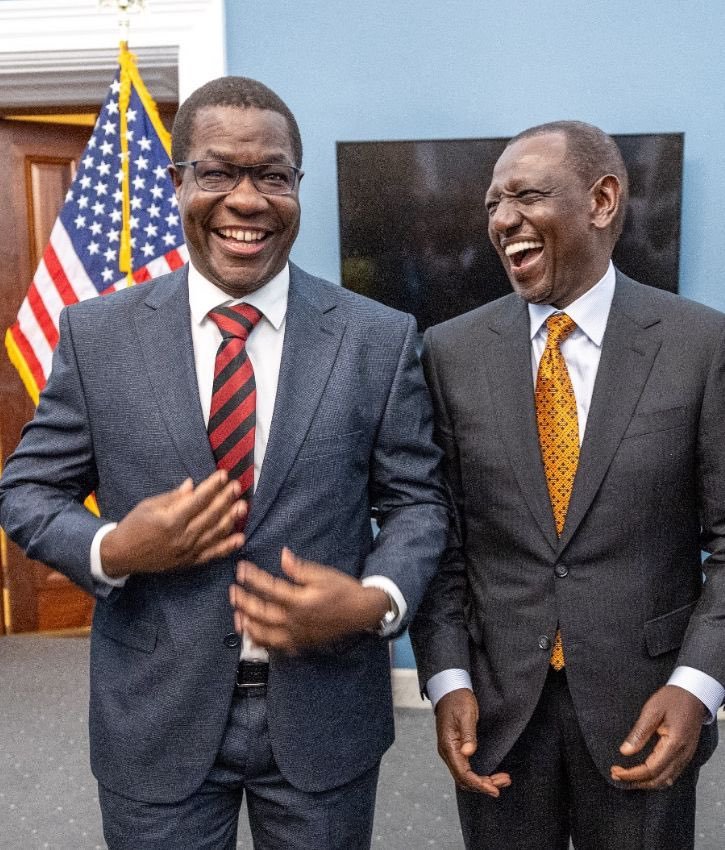
Introduction
The Adani-Ketraco deal represents a significant development in the Kenyan energy sector, aimed at enhancing the country’s power infrastructure and addressing the ever-growing energy demands. This strategic partnership between the Adani Group, a prominent Indian multinational, and the Kenya Electricity Transmission Company (Ketraco) symbolizes an important investment in renewable energy and modernization of the national grid. Such initiatives are crucial for Kenya, as they not only bolster energy security but also aim to improve the overall efficiency and sustainability of power delivery in the region.
However, the backdrop of this promising collaboration is marred by serious fraud allegations that have emerged in the United States against the Adani Group. These allegations have raised concerns about the integrity and transparency of the partnership, prompting discussions regarding the potential ramifications for Kenya’s burgeoning energy sector. Stakeholders are increasingly concerned about how these allegations could affect the confidence of other foreign investors in the Kenyan market and the overall economic implications of this partnership.
The energy sector in Kenya is of paramount importance for economic growth and development, with reliable energy being crucial for industrial growth, technological advancement, and overall quality of life. As the nation charts its course towards achieving universal access to electricity, the uncertainties surrounding the Adani-Ketraco deal can hinder progress and subject the sector to unnecessary risks. It becomes imperative that Kenyans and policymakers remain informed and vigilant regarding these developments to ensure that the benefits of international partnerships are realized without compromise.
This blog post will dive deeper into the implications of the fraud allegations, examining their potential impact on the energy sector and what Kenyans need to understand about the future of this strategic partnership.
Background on the Adani-Ketraco Deal
The collaboration between the Adani Group and Kenya Electricity Transmission Company (Ketraco) represents a significant step in the development of Kenya’s energy infrastructure. Formed in 2015, Ketraco is a state-owned company focused on the construction and operation of high-voltage transmission lines, which are crucial for delivering electricity across the nation efficiently. The partnership with Adani Group, a conglomerate with diversified interests in energy, resources, logistics, agribusiness, and more, was established to bolster Ketraco’s capabilities in managing and expanding Kenya’s power transmission network.
The deal, signed in late 2021, involves a substantial investment from the Adani Group aimed at enhancing the country’s energy capacity, which has become a pressing need as Kenya seeks to meet the growing demand for electricity. This partnership is expected to include upgrades to existing infrastructure and the establishment of new transmission lines, which would lead to improved power supply reliability and reduced electricity costs for Kenyan consumers. Furthermore, the Adani Group’s expertise in renewable energy is anticipated to play a crucial role in transitioning Kenya towards sustainable energy sources, aligning with the nation’s goal of increasing its reliance on green energy.
In light of rising energy demands and the potential for economic growth driven by improved infrastructure, the Adani-Ketraco deal reflects a strategic approach to addressing these challenges. The agreement is poised to not only enhance energy access across urban and rural areas but also contribute significantly to job creation and stimulate local economies. As discussions continue regarding the broader implications of the deal, the partnership is being watched closely by stakeholders in Kenya, who anticipate the potential benefits that this collaboration can bring to the nation’s energy landscape.
Overview of the Fraud Allegations
The Adani Group, an Indian multinational corporation, has faced significant scrutiny following fraud allegations filed against it in the United States. These allegations encompass claims of stock manipulation and financial misrepresentation, raising questions regarding the integrity of the company’s financial practices. The allegations emerged prominently after the release of a report by a short-seller, which accused Adani entities of inflating stock prices to boost their market valuations. This has resulted in a dramatic decline in the stock prices of various Adani companies, stirring concerns among investors and stakeholders alike.
As part of the ongoing investigations, regulators in the United States are examining numerous financial documents and transactions linked to the Adani Group. These investigations aim to establish the validity of the claims made and ascertain whether there has been any wrongdoing that contravenes legal statutes regarding securities trading. Such allegations, if substantiated, could have severe repercussions for the company, potentially affecting its global operations and reputation.
The revelations surrounding these fraud allegations are particularly relevant to the Kenyan context, especially in light of the recent partnership between Adani and Kenya Electricity Transmission Company (Ketraco). With ongoing projects in the energy sector, any findings that suggest fraudulent activities could undermine investor confidence not only in Adani but also in future foreign investments in Kenya. Stakeholders in Kenya should remain informed about the developments and outcomes of these investigations, as they could influence strategic decisions and policies in the energy sector, impacting the overall economic landscape of the nation.
Kenya’s Energy Sector Challenges
The energy sector in Kenya is currently grappling with a multitude of challenges that have far-reaching implications for its overall development. These challenges are primarily centered around sustainability, capacity constraints, and the pressing need for foreign investment. The nation’s power generation predominantly relies on renewable sources, notably geothermal and hydroelectric energy. However, the sustainability of these resources is under constant scrutiny, particularly in light of climate change and environmental degradation. The fluctuating nature of rainfall and the impacts of prolonged droughts have exposed the vulnerability of hydroelectric power, prompting the need for more diverse energy sources.
Capacity issues further exacerbate the challenges faced by the energy sector. Despite recent investments in expanding electricity generation capacity, demand has surged in tandem with Kenya’s rapid economic growth. The slow pace of infrastructure development has left significant gaps in distribution and transmission networks. Consequently, intermittent power supply remains a persistent problem, affecting both residential and business sectors. This situation underscores the urgent necessity for more robust energy solutions that can accommodate the increasing consumption rates and provide reliable services.
Moreover, foreign investment is critical in addressing these challenges. International partnerships can accelerate the pace of technological advancements and funding needed to bolster energy projects. Such cooperative initiatives can help improve the efficiency and sustainability of energy systems by bringing in expertise and financial resources. The recent Adani-Ketraco deal epitomizes the potential benefits of foreign investment, as it aims to enhance the infrastructure and operational capacity of Kenya’s energy sector. By effectively addressing these challenges, the sector can pave the way for economic growth and improve the quality of life for the populace.
CS Energy’s Defense of the Deal
The Energy Cabinet Secretary has articulated a robust defense of the Adani-Ketraco deal amidst ongoing fraud allegations involving the Adani Group in the United States. In a statement to the media, the Cabinet Secretary emphasized the strategic importance of this partnership in advancing Kenya’s energy infrastructure and meeting the nation’s growing energy demands. The deal, which focuses on enhancing the transmission capabilities of the Kenya Electricity Transmission Company (Ketraco), is viewed as a critical step towards ensuring reliable power distribution across the country.
The government has underscored its commitment to maintaining transparency and accountability throughout the process. While the allegations against Adani are serious, the Cabinet Secretary noted that these do not detract from the benefits the deal would bring to the Kenyan energy sector. “Investments in energy are vital for our economic growth and development,” the Secretary stated, highlighting that the partnership could generate jobs and stimulate local economies. Furthermore, Kenya’s commitment to renewable energy sources aligns with broader global efforts to transition towards sustainable energy systems, making the deal even more relevant.
To address the concerns raised by the allegations, the government has pledged to establish stringent oversight mechanisms. This includes regular audits and compliance checks to ensure that all operations adhere to both local and international regulations. The Energy Cabinet Secretary reiterated that the Kenyan government remains vigilant in its efforts to protect its investments and uphold its reputation in the global market.
Ultimately, the defense of the Adani-Ketraco deal reflects the Kenyan government’s resolve to navigate challenges while fostering an environment conducive to investment. By prioritizing strategic partnerships, the government aims to propel the nation towards a more secure and sustainable energy future, despite the hurdles presented by current allegations.
Potential Implications for Kenyans
The ongoing allegations of fraud associated with the Adani-Ketraco deal are likely to have significant implications for Kenyan citizens. One of the foremost concerns is the potential impact on energy prices. As investigations unfold, uncertainties surrounding the deal could lead to market instability, which in turn may cause fluctuations in electricity tariffs. This scenario could impose added financial burdens on households and businesses already grappling with rising energy costs. The public is justifiably concerned, as any increase in electricity rates could further strain the economy and affect overall living standards.
Moreover, the security of the energy supply is paramount for Kenya’s continued growth and development. The fraud allegations may undermine trust in the stakeholders involved, leading to doubts about the reliability of the energy infrastructure that is crucial for industrial and residential use. A compromised energy supply can hinder economic activities and investment confidence, thereby impacting job creation and development projects across the nation.
Furthermore, the energy sector’s political aspect cannot be overlooked. The Kenyan government may feel pressured to reevaluate its policies and regulations in light of these allegations. This situation poses a challenge for policymakers, as they must demonstrate their commitment to transparency and accountability. As public sentiment is increasingly vocal against perceived malpractices, the government may need to implement stricter oversight and regulatory frameworks to rebuild trust.
As Kenyans navigate these developments, their concerns over energy prices, supply security, and governmental responses will continue to influence public discourse. Engaging stakeholders and ensuring a transparent dialogue are essential steps the government can take to address citizen anxieties and uphold the integrity of the energy sector during this tumultuous period. Ultimately, vigilance and responsible decision-making will be crucial in mitigating the negative consequences linked to the ongoing fraud investigations.
Comparative Analysis with Other Countries
In evaluating Kenya’s response to the ongoing fraud allegations surrounding the Adani-Ketraco deal, it is imperative to examine how other nations have handled similar challenges in the realm of foreign investment within their energy sectors. Various countries have faced accusations of misconduct, and their respective approaches can yield significant insights for Kenya.
For instance, Brazil encountered substantial turbulence during its dealings with the energy sector when corruption scandals emerged involving significant foreign investments. The country adopted a multi-faceted strategy, initiating comprehensive investigations and strengthening regulatory frameworks to enhance transparency. Brazil’s efforts to involve civil society and implement whistleblower protection systems proved pivotal in rebuilding trust among investors and the public alike.
Similarly, in India, allegations concerning foreign investments in large-scale energy projects prompted a reevaluation of governance and oversight mechanisms. The Indian government instituted robust auditing processes and fostered public-private partnerships to ensure mutual accountability. These strategies not only stemmed potential fraud but also created a more conducive environment for sustainable investments.
In contrast, a country like Nigeria, faced with myriad allegations surrounding energy contracts, exhibited a less effective response. The lack of decisive action and transparent communication allowed speculation to proliferate, undermining investor confidence and leading to project delays. Nigeria’s experience highlights the critical importance of timely and clear communication in managing public perception and ensuring accountability.
Drawing from these global examples, Kenya may consider implementing enhanced regulatory measures and fostering stakeholder engagement to address the concerns raised by the allegations against the Adani-Ketraco deal. The urgency to learn from these experiences is paramount, as it can help Kenya safeguard its interests while also promoting a favorable investment climate in the energy sector.
Future of the Adani-Ketraco Deal
The future of the Adani-Ketraco deal remains uncertain amid ongoing investigations and mounting public scrutiny regarding allegations of fraud in the United States. This partnership, which aims to enhance Kenya’s energy infrastructure and expand connections, has significant implications for the energy sector in the region. As the situation unfolds, several potential scenarios may emerge regarding the continuation, modification, or cessation of the partnership.
One possible outcome is the continuation of the Adani-Ketraco deal, contingent upon the resolution of the allegations and the establishment of transparency in operations. Should investigations conclude without substantial evidence of wrongdoing, it is likely that the deal will proceed as planned. This would bode well for Kenya, as the expansion of energy infrastructure is crucial for economic growth and power accessibility across the nation. Enhanced collaboration could potentially lead to improved job creation and foreign investment, strengthening Kenya’s position as a key player in the East African energy market.
Conversely, if the ongoing investigations yield unfavorable results for Adani or if public sentiment turns against the deal, the partnership may face significant modifications or even cessation. In such a scenario, Ketraco may be compelled to reassess its collaboration, seeking alternative partnerships or renegotiating terms to address concerns and safeguard public interest. This might delay crucial energy projects and impact progress in the country’s renewable energy initiatives.
Ultimately, the Adani-Ketraco deal is at a crossroads, shaped by external factors, regulatory actions, and public perception. Stakeholders must closely monitor the developments as they will significantly affect the direction of energy strategies in Kenya. In this period of uncertainty, the association’s future hinges on transparency and the ability to navigate the complexities of international disputes while ensuring that the evolving energy landscape serves the interests of all Kenyans.
Conclusion
The recent allegations surrounding the Adani-Ketraco deal have brought substantial scrutiny to the Kenyan energy sector, prompting calls for greater transparency and accountability in foreign investments. As various stakeholders, including government officials and energy regulators, navigate the complexities of this situation, the implications for public trust are significant. The integrity of such partnerships will ultimately dictate the perception of foreign investment in the Kenyan market.
With the Energy Cabinet Secretary defending the deal, it showcases the necessity for a balance between attracting investment and ensuring that due diligence is a core component of any agreement. Concerns about fraud in the USA have elevated the conversation about the reputability of potential partners, acting as a critical reminder that investors must rigorously evaluate the companies they engage with. This incident underscores the importance of establishing a robust regulatory framework that can effectively address any iffy dealings and uphold the principles of fairness and equity.
Moving forward, the Kenyan energy sector must prioritize transparency to restore and maintain the public’s trust. Engaging with communities and stakeholders to clarify the details of such partnerships is essential to foster confidence in upcoming projects. In addition, continuous monitoring and assessment of foreign collaborations will assist in preemptively identifying any red flags that could jeopardize investments. Only through a concerted effort focused on accountability can Kenya cultivate a thriving energy sector that is resilient against potential malpractice, thus ensuring sustainable development and promoting stability within the investment landscape.



